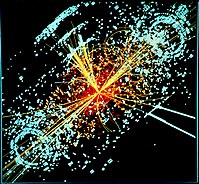
The Higgs boson is a hypothetical massive scalar elementary particle predicted by the Standard Model. It plays a key role in explaining principals of mass. It was first theorized in 1964 by Peter Higgs, François Englert, Robert Brout, Gerald Guralnik, Carl Hagen, and Tom Kibble. It is the only particle of the standard model not yet observed, despite the attempts of researchers at Fermilab to detect it. It is also a major aim of the upcoming Large Hadron Collider to do so.
The properties of the Higgs boson can have large implications in physics. For example, if the mass of the Higgs boson is between 115 and 180 GeV, then the Standard Model can be valid at energy scales all the way up to the Planck scale. Measurements of the Higgs boson may also lead to a deeper understanding of the forces.